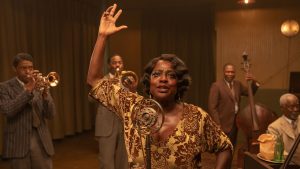I expected a lot from “Ma Rainey’s Black Bottom.” After all, it stars the always-forceful Viola Davis and the late, great Chadwick Boseman. Unfortunately, I ended up disappointed.
The movie, based on August Wilson’s play, takes place over the course of single day at a recording studio in Chicago in 1927. Ma (Davis) is known as the “Mother Of The Blues,” a successful singer who isn’t taking crap from anybody, including the white men who are her manager and the owner of the studio. She sees them as just two more guys who want to profit off her talent without giving her the respect she deserves — so she uses her leverage to keep as much control as she can.
Davis imbues Ma with a forceful weariness that sucks up all the energy in the room. If I hadn’t looked it up, I wouldn’t have known that she doesn’t do the singing because her lip-syncing and physicality are so convincing (it’s actually Maxayn Lewis, once one of the Ikettes who backed up Ike & Tina Turner). But it’s no more reasonable to expect Davis to handle the vocals than to diss Boseman and his co-stars for not playing their instruments. It’s enough that Davis physically transformed herself — including a considerable weight gain, heavy eye makeup, and gold caps on her teeth — to portray the blues legend.
Ma doesn’t have any patience for Levee (Boseman), the trumpet player in her band who has his own ideas about how the songs should be arranged, and is unafraid to tell her so. He’s a firebrand who can’t wait to start his own group and record his own songs, if only the studio owner would give him a chance. Levee gets a couple of showcase speeches about the nightmares of his past and his dreams for the future, but it’s easy to see that things won’t end well for him.
It’s a great final role for Boseman, who is impossible to look away from, and may very well win him a posthumous Oscar that will serve as a career-capper a la Heath Ledger. I didn’t run a stopwatch, but I think Boseman is on screen more than Davis.
Director George C. Wolfe wisely puts the supporting actors in the background anytime Ma steps forward, giving Davis the spotlight she deserves. Glynn Turman, Colman Domingo, and Michael Potts hold their own as the other band members, who are happy to do whatever Ma wants, but are tired of Levee’s mouthing off.
With all of those positives, it’s too bad Wilson’s story doesn’t go very far. Once the basic conflicts between protagonist and antagonist(s) are established along with the impact of racism on nearly everyone involved, they’re repeated in different forms until an unsatisfactory resolution to the story. While I respect everyone involved in this project (including producer Denzel Washington, who’s taken it upon himself to shepherd ten of Wilson’s plays from stage to screen), it left me feeling unfulfilled.
Thus, I can only give “Ma Rainey’s Black Bottom” a 7 out of 10. It’s now streaming on Netflix.

